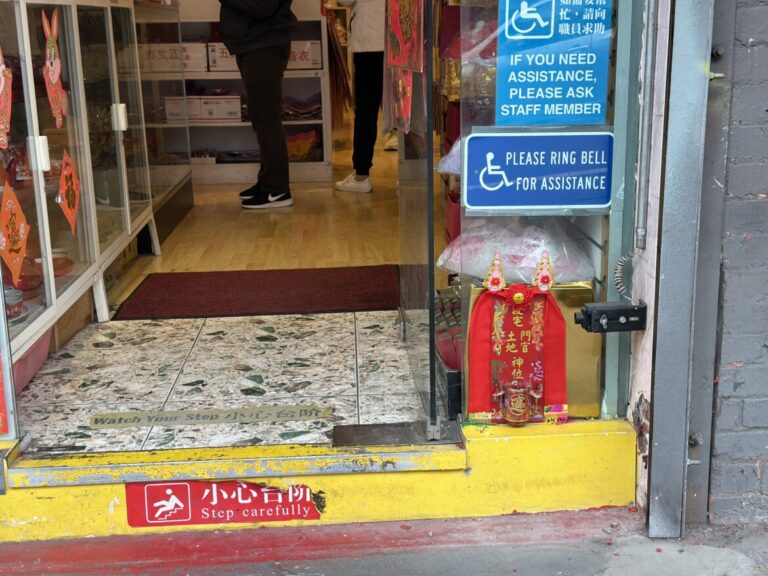San Francisco Board of Supervisors Votes to End Accessible Business Entrance Program
In a significant move, the San Francisco Board of Supervisors voted unanimously to discontinue the Accessible Business Entrance program, redirecting focus from local enforcement to education surrounding state and federal accessibility standards. This decision comes after several postponed attempts to enforce the program, which faced criticism for its implementation challenges.
The Struggle for Accessibility in Chinatown
Magan Li, owner of a shop in Chinatown that specializes in traditional ritual items, has long grappled with the accessibility of her storefront. Since taking over in 2007, she has sought solutions to address a large step that poses a tripping hazard. Despite reaching out to contractors and architects, Li learned that city regulations prevented modifications that would obstruct public sidewalks. Ironically, she later faced warnings about potential fines for her store’s inaccessibility, highlighting a concerning gap between city requirements and support for local businesses.
Implications of Program Rescission
With nearly 7,000 businesses in San Francisco failing to comply with accessibility mandates or not reporting their status, the decision to eliminate the program has sparked a debate. Disability advocates argue that rescinding the ordinance could create a dangerous precedent, undermining efforts to improve access for individuals using mobility devices. The ordinance was initially introduced in 2016 to mitigate a surge in lawsuits targeting small businesses for accessibility violations. Many owners opted for settlements rather than facing costly legal battles, hoping the ordinance would foster proactive changes.
Concerns Over Enforcement and Compliance
Board of Supervisors President Rafael Mandelman, advocating for the recent vote, suggested that enforcement would divert crucial city resources away from struggling businesses during an already challenging economic landscape exacerbated by the COVID-19 pandemic. He noted that many small business owners are sympathetic cases.
Sharky Laguana, former president of the Small Business Commission, echoed these concerns, stating that strict enforcement could push already vulnerable businesses toward closure, while improvements in access would be marginal in many cases. Advocates for disability rights countered, asserting that accessible grants are available, but businesses have not fully utilized these resources.
Seeking Flexible Solutions
Walter Park, a member of the Access Appeals Commission, suggested extending compliance deadlines rather than eliminating the ordinance entirely. He emphasized that ongoing efforts toward accessibility should be prioritized, regardless of the time taken to achieve full compliance. Other advocates warned that the city’s retreat from its responsibilities could erode trust in the enforcement of accessibility requirements.
Anni Chung, president of Self-Help for the Elderly, reinforced the need for adaptable solutions to ensure assistance reaches all eligible business owners.
Barriers to compliance continue, as business owners mentioned delays in the approval process for modifications required to meet accessibility standards. This bureaucratic red tape has made it difficult for them to navigate the city’s systems effectively.
Li’s Experience with Navigating Access Solutions
For Li, the journey toward compliance feels daunting. She described her struggle to understand complex regulations and the challenge of communicating her needs without language support. Fortunately, organizations like BeChinatown have stepped in to assist in her case by helping secure exemptions and implementing simpler solutions, such as a doorbell to signal customers’ arrivals.
Nevertheless, Li remains anxious about her vulnerability to lawsuits stemming from federal accessibility laws, acknowledging the balancing act between making her store compliant and maintaining its inventory space essential for business operations.
Looking Ahead
The Board’s decision to focus on education and outreach rather than enforcement reflects a broader shift in addressing accessibility issues within the city. Under the new initiative proposed by Mandelman, efforts will concentrate on providing resources and information to aid business owners in navigating the complexities of accessibility standards.
As this debate unfolds, it raises critical questions about the city’s future approach to ensuring accessibility for all, particularly for vulnerable populations relying on safe access to public spaces.



